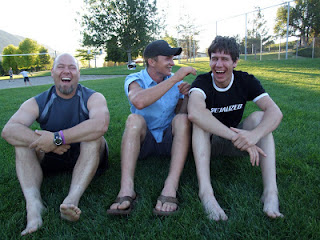In C.S. Lewis' wonderful poem "Donkeys' Delight"
the Oxford don likens salvation to entering into "the excellent joke"
which at first glance seems a tad strange, or at the very least, a little
trite. But when you consider the essence/makeup of jokes it actually makes
perfect sense. Every joke has a "setup" which takes the hearer in a
particular direction. The "punchline" is simply an unexpected
diversion from the path established by the "setup." Here's an
example:
Setup - "When I die, I want to go like my grandfather did, in his sleep..."
Punchline - "Not like all the other people in the car, screaming and yelling."
The setup establishes certain stock scenes and/or motifs. The punchline wrenches us from those scenes and takes us (quite unexpectedly) to an entirely different scene. And when it does, we laugh, giggle or guffaw.
Now, this being the case, Lewis is spot-on. Salvation is the ultimate "excellent joke."
Setup - Adamic and personal sin against a three-times holy God invoking His just and holy wrath.
Punchline - Free grace, pardon, cleansing and adoption as sons.
And so Lewis concludes:
I repented, I entered
Into the excellent joke
The absurdity. My burden
Rolled off as I broke
Into laughter; and soon after
I had found my own level;
With Balaam's Ass daily
Out at grass I revel,
Now playing, now braying
Over the meadows of light
Our soaring, creaking Gloria
Our donkeys' delight
Hmm...no wonder we Christians laugh/bray so much, and so heartily...
Setup - "When I die, I want to go like my grandfather did, in his sleep..."
Punchline - "Not like all the other people in the car, screaming and yelling."
The setup establishes certain stock scenes and/or motifs. The punchline wrenches us from those scenes and takes us (quite unexpectedly) to an entirely different scene. And when it does, we laugh, giggle or guffaw.
Now, this being the case, Lewis is spot-on. Salvation is the ultimate "excellent joke."
Setup - Adamic and personal sin against a three-times holy God invoking His just and holy wrath.
Punchline - Free grace, pardon, cleansing and adoption as sons.
And so Lewis concludes:
I repented, I entered
Into the excellent joke
The absurdity. My burden
Rolled off as I broke
Into laughter; and soon after
I had found my own level;
With Balaam's Ass daily
Out at grass I revel,
Now playing, now braying
Over the meadows of light
Our soaring, creaking Gloria
Our donkeys' delight
Hmm...no wonder we Christians laugh/bray so much, and so heartily...



